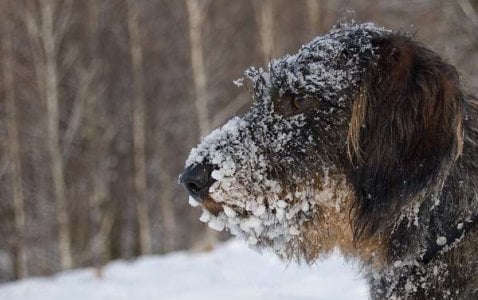Is it safe to leave your dogs outside in winter? Outrage over a man's pets left in frigid conditions sparks debate!
By
VanessaC
- Replies 8
Is it safe to leave your dogs (or other animals) outside in winter? With temperatures around South Australia plummeting, one man has shared an expletive-laden note left for him by a passerby who wasn't impressed by his pets being left outside in almost freezing conditions.
The man from Murray Bridge, South Australia, discovered the note taped to his wife’s car after temperatures at their home dropped early on Monday morning. The note read: 'Your [sic] a lousy human. 4C to under 2C and dogs outside. F**k me, what a c**t.'
The angry dog owner responded to the letter leaver with a message of his own, taking his defence to a local page.
'To the d***head who left this note on my wife's car this morning,’ he began. ‘You know nothing about my dogs, they have kennels inside a shed as well as outside.'
'You must have been busy this morning writing notes to everybody that has dogs outside. What the f**k was [sic] you snooping around that time of the morning anyway?'
'If you are so concerned about my dogs go up and pat them,’ he said, adding that they knew who left the note all thanks to a neighbour’s security camera.
His post prompted many comments, with many sympathising with him.
‘Crazy how dogs and other animals survive in the wild,' one person wrote.
‘My two dogs sleep outside and keep warm together in their large crate, and extra dog bed... so what.. how rude to do that to you,' another person said.
But can pets actually be left outside in winter?
RSPCA South Australia advises pet owners to take precautions when leaving animals outside in the cold.
While dogs like the Siberian Husky or Alaskan Malamute have a dense undercoat designed to tolerate sub-zero temperatures, other breeds, like Chihuahuas and Greyhounds, possess single-layered, thin coats that offer less protection against the cold. They advise that domesticated animals that are short-coated, elderly, young, underweight, and unwell animals are especially vulnerable to temperature drops.
Pets can experience frostbite and hypothermia, just like humans. Their extremities–such as their paws, ears, and tail–are particularly susceptible. A drop in body temperature can hamper their immune system, making them susceptible to illness. Dehydration is also common in winter, as pets might be reluctant to drink ice-cold water.
Pets with underlying conditions like arthritis can also experience a worsening of their symptoms during colder temperatures. The cold can make joints stiff and painful, leading to decreased activity, weight gain, and sometimes even depression.
An added factor people need to remember is wind chill. Like humans, lower wind chill can make a pet's body lose heat faster, making it significantly colder than the actual air temperature.
To help keep your pets safe, the RSPCA suggests creating a dry and warm place for animals to snuggle up, swapping metal bowls for plastic ones to avoid tongue-sticking situations and leaving more food, as animals burn more energy to stay warm.
Warm coats can be bought for outdoor dogs to help them through the cooler months, but smaller pets (like bunnies and guinea pigs) should be brought inside.
If you ever come across something similar remember that while being observant and concerned for animal welfare is essential, not all situations may necessarily constitute cruelty or neglect. Communication and understanding often clear the icy winter air better than heated words.

We love hearing from you–if you’ve got any tips and advice on keeping pets safe in winter, or if you’ve experienced something similar, let us know in the comments below!
The man from Murray Bridge, South Australia, discovered the note taped to his wife’s car after temperatures at their home dropped early on Monday morning. The note read: 'Your [sic] a lousy human. 4C to under 2C and dogs outside. F**k me, what a c**t.'
The angry dog owner responded to the letter leaver with a message of his own, taking his defence to a local page.
'To the d***head who left this note on my wife's car this morning,’ he began. ‘You know nothing about my dogs, they have kennels inside a shed as well as outside.'
'You must have been busy this morning writing notes to everybody that has dogs outside. What the f**k was [sic] you snooping around that time of the morning anyway?'
'If you are so concerned about my dogs go up and pat them,’ he said, adding that they knew who left the note all thanks to a neighbour’s security camera.
His post prompted many comments, with many sympathising with him.
‘Crazy how dogs and other animals survive in the wild,' one person wrote.
‘My two dogs sleep outside and keep warm together in their large crate, and extra dog bed... so what.. how rude to do that to you,' another person said.
But can pets actually be left outside in winter?
RSPCA South Australia advises pet owners to take precautions when leaving animals outside in the cold.
While dogs like the Siberian Husky or Alaskan Malamute have a dense undercoat designed to tolerate sub-zero temperatures, other breeds, like Chihuahuas and Greyhounds, possess single-layered, thin coats that offer less protection against the cold. They advise that domesticated animals that are short-coated, elderly, young, underweight, and unwell animals are especially vulnerable to temperature drops.
Pets can experience frostbite and hypothermia, just like humans. Their extremities–such as their paws, ears, and tail–are particularly susceptible. A drop in body temperature can hamper their immune system, making them susceptible to illness. Dehydration is also common in winter, as pets might be reluctant to drink ice-cold water.
Pets with underlying conditions like arthritis can also experience a worsening of their symptoms during colder temperatures. The cold can make joints stiff and painful, leading to decreased activity, weight gain, and sometimes even depression.
An added factor people need to remember is wind chill. Like humans, lower wind chill can make a pet's body lose heat faster, making it significantly colder than the actual air temperature.
To help keep your pets safe, the RSPCA suggests creating a dry and warm place for animals to snuggle up, swapping metal bowls for plastic ones to avoid tongue-sticking situations and leaving more food, as animals burn more energy to stay warm.
Warm coats can be bought for outdoor dogs to help them through the cooler months, but smaller pets (like bunnies and guinea pigs) should be brought inside.
If you ever come across something similar remember that while being observant and concerned for animal welfare is essential, not all situations may necessarily constitute cruelty or neglect. Communication and understanding often clear the icy winter air better than heated words.
Key Takeaways
- A South Australian man received an aggressive note from a passerby for leaving his dogs outside in freezing conditions.
- The dog owner retorted on a local community page insisting the dogs had kennels inside and outside the shed.
- Many online commenters sided with the dog owner, criticising the passerby for making assumptions about the dogs' living conditions.
- RSPCA South Australia urges pet owners to take precautions when leaving animals outside in cold weather, advising them to create warm, dry spaces and to consider bringing smaller pets indoors.










